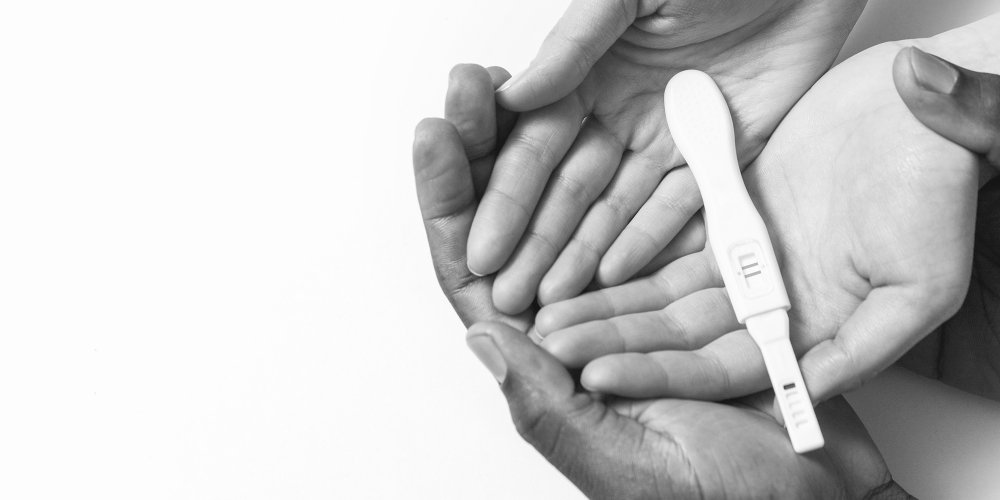There is she and him. They love each other and decide to have a child. She stops the pill, or has her IUD removed. In making love, beyond pleasure, they dream of a cute baby, toys, school books and skinned knees. Months go by, she does not get pregnant. When she starts to worry, her gynecologist tells her, "It'll come, do not think about it anymore." But it does not come and she only thinks about it.
So she convinces her partner. We will go for exams. Blood taken, X-rays of the fallopian tubes and uterus for her, spermogram for him . Sometimes they are asked to rush to the testing lab within an hour of having sex. Then they force themselves more and more, obsessed by her eggs, by her sperm. Sometimes doctors find an explanation, sometimes not. But the facts are there: the child will not arrive naturally. We control a lot of things but not that.
A diagnosis that turns everything upside down
When the diagnosis of infertility falls, the couple wobbles. Why me ? Why us ? How to project into the future when the dream of continuity deserts the future? What to do ? Adopt? Perhaps. Not yet. We want to continue a lineage, to have a child "of" oneself. So we turn to medicine, we will ask him to overcome the deficiencies of the body, reproductive mechanics.
In the most rebellious cases, we will start in vitro fertilization (IVF). More than 23,000 births a year in France are the result of an artificial insemination or IVF. Not huge, but enough to leave room for hope. For weeks, even months, the couple will become a household of three: she, him and medicine. Under the effect of massive injections of hormones, it will turn into an egg factory. He, except the day he gives his sperm, feels out of touch, relatively helpless. Everything revolves around her body.
How to overcome the test without exploding?
To cope, no recipe, of course, except that of the word that explores the desire for a child, which puts the distance between the couple and its test, which sometimes prepares for renunciation. But to whom? To the family ? Often too heavy, especially when the child who can not be born is the stake of an unconscious rivalry between the mother and her sterile daughter. The friends ? Yes when they know how to listen, not when the intimacy exposed makes them uncomfortable.
Remain the associations, if one has the chance to find one. In the French West, between Rennes and Nantes, two women created Amphore (www.amphore.fr). Sylvie and Ginou have been friends forever. The first was a midwife, the second caregiver. Faced with the distress of couples in medically assisted procreation (PMA) , they have embarked on volunteering. Through Amphora, they listen, individually or in groups, support and guide. It is thanks to them that we met the women and the man who opened their hearts to us.
Sterility in the couple: they tell
- Aline, 32, married for twelve years, Senior Manager.
After years of unsuccessful attempts, medical tests show that her husband's sperm is of poor quality. The simplest solution would be anonymous donor insemination, but her husband refuses.
"For him, knowing that the child was genetically from him was very important.The only remaining possibility was in vitro fertilization with intracytoplasmic sperm microinjection (Icsi) . * Treatment begins in June 2007, after a lot of painful exams and soon I realize that I can not lead a career in finance and in vitro fertilization.Between appointments at the gynecologist and the center of PMA , the side effects of bites and blood tests almost daily, I can not keep up the pace.I decide to resign.The ovarian stimuli are extremely painful.
I am exhausted, bloated, irritable.
While I am already very myopic, my vision becomes more and more troubled.
Finally, I manage to "lay" thirteen oocytes, which are collected under local anesthesia. At the same time my husband gives his sperm, immediately centrifuged and selected. After f écondation vitro, biologists get new embryos. I'm implanted one and we freeze the other eight.
Begins waiting, mixing hope and apprehension. My body reacts very quickly, my breasts swell, but after two weeks, we realize that implantation did not work. The gap with my husband then becomes bigger and bigger. I'm locked up all day, my life is only around that, while he goes to work every morning. I live it in my body in a very intense way, but for him, apart from sperm donation, it remains abstract. He listens to me but does not speak. I feel more and more alone.
My intimacy is constantly delivered to a medical team.
I feel like doing the child either with my husband but with the gynecologist.
And then revolt: it is he who has problems of fertility, it is I who undergoes the treatments. After the first failure, I am obsessed with the death of the embryo. My husband does not understand my grief. In October 2007, an implantation with a frozen embryo is repeated. I'm sure it will not work. The idea of a frozen thing that would become alive again, it seems crazy to me. And indeed, it did not work.
There, I feel at the crossroads. I am entitled to two more attempts supported by the Secu. I'm not sure if I want to put that back. I make an appointment with a psychiatrist to try to clear things up with my husband so that he can finally put words on his feelings. I would like to convince him to admit the use of artificial insemination with donor sperm (DAI) , but I am afraid that he can not fully appropriate a child born by insemination. If he refuses me this chance, I do not know what we are going to do .. "
(*) Used in the case where the spermatozoa are deficient, the Icsi consists of sorting one of good quality and injecting it directly into the oocyte.
- Éléonore and Bertrand, 31, married for ten years, executives.
Eléonore has the trumpet bite: impossible to avoid in vitro fertilization. The first ovarian stimulation begins in autumn 2005. The couple tells how they went through this ordeal.
Eléonore: During the hormonal treatments, I was hyper-aggressive, tired, a bad word and I took the fly. When I was angry, I happened to say to Bertrand: "Shut up, if I want, you'll never have a child." For hugs, I was not motivated. As sex could not lead to procreation, I could not see the point ...
Bertrand: I started from the premise that as she was the one who endured everything, I went on without saying anything. I compensated for my helplessness by being entirely at his disposal, shopping, cooking, cleaning ... I would have done the bites in its place!
Eleonore: At the end of the treatment, I was taken fifteen oocytes under general anesthesia.
Bertrand: During the sampling, I masturbated in a local laboratory of biology. It was not pleasant, but it was nothing compared to what she endured.
Eléonore: I was implanted two embryos. Twelve days later, I went for a blood test to measure the beta HCG level. When you are pregnant, this rate doubles every forty-eight hours. The wait for the results is terrible. This is the most painful moment. In two days my rate went from 73 to 7. It was screwed up. I was not pregnant. After that, seeing people with babies was almost unbearable.
Bertrand: It was important that we change our minds, that we have another project. We had just bought the house. We started work and decoration.
Eléonore: Normally, a second in vitro fertilization can be done after a period of three months. But I was exhausted nervously, I slept very badly.
Bertrand: I told him that there was no fire, that we had to have a good time, live for us. I convinced her to take care of her until she was completely retouched.
Eléonore: We put all the chances on our side. I started yoga, acupuncture. When the second stimulation started, I was relatively fit. After a month of hormonal doses of horse, I was taken twenty-three oocytes and implanted two embryos. I felt immediately that I was nauseated, that my breasts swelled.
Bertrand: We were careful not to shout victory too quickly.
We were hanging on the results of the blood test.
Eleonore: In two days, my beta HCG level had gone from 500 to 1,700. Both embryos were implanted. The pregnancy was very delicate. I stayed in bed for months, hoping to stay as long as possible. Bertrand has everything insured. He was extraordinary. Both boys were born at 2.6 kg each.
Bertrand: Many couples explode after a PMA. We, it brought us closer. "
- Chloé, 48, marc, 46, and Li-Kiù, 7 years old.
Chloe is 31 years old when her gynecologist tells her that she has "atrophied tubes" and is therefore sterile. The shock is terrible, but the couple overcomes the test and decides without hesitation to resort to in vitro fertilization. Seven attempts, seven failures ...
"To the failure of the third IVF doubts have begun, I think that's where we realized we would never get there, but we were not ready to resign ourselves ...
In fact, we fought for seven years. As the years passed, our desire for a child turned to obsession.
It was a very painful time, both physically and psychologically. I cried a lot ... I realize today that our couple survived thanks to Marc's support. He accompanied me at every appointment, had me deliver dishes at noon, so that I move as little as possible and to increase our chances of keeping the child ... Especially, he always wanted to talk a lot.
I think that's really the key, to avoid the clash: to say things to oneself, to keep nothing for oneself and to save as much as possible the unspoken ones and the taboos. It helps not to feel guilty or to blame the other ... It was Marc who, at the seventh in vitro fertilization, spoke about the adoption. I immediately agreed, I was exhausted. I think it was really then that we mourned the biological child that we would never have.
Together. We would become parents, but otherwise. And it is by getting 100% involved in this new fight that our couple has solidified. Call, revive, make things happen ... It was not until thirteen months before one evening, at 9:30 pm, we were announced by phone that a small Chinese girl of 9 months with a beautiful smile was waiting for us. We could not stop crying anymore. Marc stammered with emotion, it was a moment of unimaginable happiness ... I will never forget the last hours of waiting, in China, at the orphanage, in monastic silence, among the other adopters ... For me, this endless waiting corresponds to my "childbirth"! (Laughter.)
When Li-Kiù was placed on my chest, I felt an unknown, almost animal emotion. I was mom. Finally our couple was not sterile! After all these trials, he is rock solid! "
The opinion of the expert on infertility in the couple
MC: Why is it so painful to discover that we are sterile?
Sylvie Faure-Pragier: This causes feelings of guilt, inferiority and amputation of the ego that can be intense. Because of sterility, the chain of generation transmission is interrupted. One can have the impression not to become adult, to remain the child of his parents.
What are the repercussions on the couple?
He is cut off from this sign of love that is pregnancy. The man and the woman must negotiate their own injury and the injury of the other. The sex life, scrutinized by doctors and biologists, obviously takes a hit.
What advice can be given to couples in the process of LDCs?
It is essential to find someone to talk to to reduce guilt, loss of self-confidence and anxiety, and to understand how to integrate the trauma of infertility in its history. A few sessions at a specialized psychiatrist can suffice.
The role of associations is also valuable. The spouse has everything to gain by compensating for his relative physical exclusion by accompanying his wife a maximum.
If the techniques of PMA do not work, it is important to prepare the renunciation of the therapeutic relentlessness in liaison with the medical team. The entourage must listen without being intrusive.
And adoption?
The law requires adoption for couples who undertake in vitro fertilization. This is, in my opinion, an error. One can only calmly consider adoption when the biological child has been renounced, not before.
And then it is important to remember that, contrary to what the social norm hammers in a more and more invasive way, one can be perfectly happy without a child.
(*) Psychoanalyst, author of "The Babies of the Unconscious" (PUF), she worked for a long time in the Reproductive Medicine Department at Necker Hospital.




